- Home
- David R. George III
Crucible: Kirk Page 11
Crucible: Kirk Read online
Page 11
“What about your father?” Edith asked. Kirk could hear in her voice a thirst for information about himself, just as he too yearned to learn more about her. He also discovered that, with Edith by his side, he did not feel the need to turn away from his childhood memories, nor to avoid talking about his parents.
“I was thinking about the nights when I was a boy that I used to walk with my father out into fields and look up at the stars,” he said.
“Were you raised on a farm?” Edith asked. He could feel her adjust the position of her head on his shoulder as she raised her face toward his in the darkened room.
“I was,” Kirk said. “In Iowa.” He knew that he shouldn’t reveal too much about himself, but he could not see how Edith knowing the place of his birth would cause any disruption.
“In England, I grew up on a farm too,” Edith said, her tone conveying her pleasure at this additional point of commonality between them. “After my mother died,” she went on, quieter, “my father just couldn’t maintain the land anymore, and we lost it.” A few nights ago, Edith had spoken of the close relationship she’d had with her father, particularly after her mother had passed away. After years of living a difficult life, her father had at last chosen to make a new start for himself and for his daughter, and he’d believed that relocating to America would allow them the best chance to do that. That had been eight years ago, and he’d died only days after he and Edith had arrived in their new country.
“My father died when I was eleven,” Kirk said. “I found him out in our north field, working the corn. It was a strong sun that day, and it turned out that he had a weak heart…” He thought to say more, but he’d never before said aloud the words he just had, and whatever would have come next caught in his throat. Tears welled in his eyes, and for just a second, he felt grateful that the lightless room concealed his weakness.
But he didn’t feel weak, he realized. He felt…free. Free to reveal to Edith—to share with her—his deepest wounds, his greatest fears, his most desperate hopes and desires. He would be utterly vulnerable to her, and yet he found that he trusted her so completely that he had not the slightest doubt that she would never betray his faith in her. He knew that, for all her days, she would love and nurture and even protect him.
A tear spilled from his eye and down the side of his face. Kirk didn’t know how she knew, but Edith reached up and gently traced one finger along his cheek. “It’s all right, Jim,” she said. “I understand.”
He knew that she did understand—what he felt for his lost parents, what he saw when he peered up at the stars, what he wanted and worked to make happen for the human race. Edith understood that and more, much more. “I get through my days by not thinking about it,” Kirk admitted, “but I miss my mom and dad.”
“I know,” Edith said, placing her hand lightly against the side of his face. “But they would want you to go on. They would be proud of you for doing so.” The words could have sounded like a hopeful fantasy or even a sort of appeasement, but delivered by Edith, they rang true.
Kirk reached up and took Edith’s hand in his own, squeezing it in a wordless display of the emotion he felt for her. She squeezed back, then pushed up from bed. Before he knew what she was doing, her lips brushed tenderly against his own.
Tonight, after he had walked her home from the mission, she had invited him here, into her one-room apartment. They had swept easily, naturally into each other’s arms, their movements sure and effortless, like those of longtime dance partners. Their lovemaking had developed at its own pace, by turns languorous and slow, then fevered and full of energy. She could not have been more right for him, nor he for her.
In the darkness, Edith lowered herself back to his side, back into arms. She again rested her head on his shoulder. After a moment, she said, “Do you have any sisters or brothers?”
“I do,” Kirk said. “I have an older brother, Sam. He and his wife have also given me three nephews.”
“That’s wonderful,” Edith said, and Kirk perceived in the assessment the sense that she had no family of her own left to her.
“They’re good boys,” Kirk said, though Sam’s two older sons had both reached their twenties. “I haven’t seen my brother and his family in almost two years.” He could hear the wistfulness in his own voice. It had been just before Kirk had taken command of the Enterprise that Sam and Aurelan had brought their family on a surprise visit to see him off on his first captaincy. He had been deeply touched by their gesture, and he realized now how much he missed them all—especially Sam. “I’d love for you to meet them,” he said without thinking.
“I’d like that too,” Edith said.
For a moment, Kirk cursed himself for his foolishness, but he could not maintain his anger. Even though he knew that Edith would never meet Sam, that she would never be more a part of his life than she was right now, his sentiment remained true: he would love for her to meet his brother. In fact, he wanted to share all of his life with her.
Edith raised herself up again, this time onto her elbows, her hands resting on Kirk’s chest. “Where is your brother?” she asked. “What does he do?”
“He’s a scientist,” Kirk said with the exuberant pride of a younger brother. “He’s—” On Deneva, Kirk thought, but he knew he could not say that. “—out of the country doing research right now,” he finished, prevaricating but not actually lying. He didn’t think that he could lie to Edith.
“Well, when he gets back,” Edith said, “I’ll have to ask him about you…perhaps about what you were like as a boy.”
“Whatever he tells you, don’t believe it,” Kirk joked, despite the impossibility of such a meeting ever occurring. “They’ll just be the musings of a man jealous of his younger brother.”
“Oh, I see,” Edith said. “And what reason does Sam have to be jealous of you?”
Kirk felt the smile on his lips fade as he stared up into the darkness where he knew Edith’s face to be. “For one thing, because I have you.” He knew that this relationship with Edith would end, that it must end, and yet in this isolated time with her, none of that mattered. “The entire universe should envy me because I have you in my life.” Even though his time with her would end up measured merely in days, he still believed that.
“You are very sweet, Mister Kirk,” Edith whispered. Again, he felt her lips touch his. They kissed slowly, passionately.
When at last their lips parted, Kirk said, “I love you.”
“And I love you,” Edith responded.
Kirk’s heart had never been so full, and even though he knew that it never would be again, right now, he didn’t care. If he could freeze time, preserve this moment in amber, he would, but he ignored the fact that he couldn’t. He threw himself wholly into this instant, opened himself up to experience every trace of emotion within him.
“Edith,” he said, loving even the sound of her name. He pulled her down on top of him, and once more, they moved together in the darkness of her room. He wished the night would last forever.
NINE
(2271/2276)
In the parkland outside Mojave, California, Jim Kirk peered at the other version of himself and wondered which one of them had gone mad. His wounded double had suggested a plan to prevent the converging temporal loop by using the Guardian of Forever in the year 2293, despite that the mysterious artifact had been annihilated in 2270 when Korax had crashed his battle cruiser into it. “Yes,” Kirk said, agreeing with his bloodied counterpart about the flaw in the plan. “The Klingons.”
“I’m hoping it won’t matter,” said the other Kirk.
“Hoping?” Kirk said, uncomfortable with the idea of leaving anything to chance. But then his alter ego explained why he believed that his plan would work, despite—perhaps even because of—Korax’s final destructive act. It would require an action, the success of which could not be guaranteed, but Kirk also felt confident that it could be achieved. If not, then there would be one other possibility for success, though
it would be arduous and risky. Of course, all of this posed a risk.
“So where do I begin?” he asked. “How do I leave the nexus?”
“Here,” the other Kirk said, and he held out his arm as though ushering Kirk into a room.
Kirk looked to where his counterpart motioned, and there he saw not the spires and edifices of Mojave, but a dim, open plain. Above, a sunless sky provided only the faint illumination of the stars. He peered about and saw only a flat, empty expanse stretching away in every direction. It took him a moment, but then he recognized their location: one of the artificial worlds of the Otevrel.
He gazed over at the other Kirk and noticed him bathed in the yellow glow of the old self-contained life support belts. Glancing down, he saw a similar radiance about his own body, one of the belts encircling his own waist. He knew that by the time the Enterprise had encountered the Otevrel, the life support belts had fallen out of use in Starfleet because of health concerns, but then he had already learned well that what had occurred in the real, physical universe often did not get reproduced precisely in the nexus.
“Why are we here?” he asked.
The other Kirk shrugged. “This seems to be the place from which you or I can leave the nexus,” he said. “I’m sure it doesn’t have to be this place, but this is what my mind conjured up when I first intended to depart.”
Kirk nodded. That explanation made no more or less sense than anything else within this timeless, unreal domain. “So where should I begin?” he asked. “And when?”
“You remember the historical research done on the Guardian’s world, the efforts made to identify the origin of the time vortex,” the other Kirk said. Though he had offered a statement of fact rather than asking a question, his tone invited a response.
“Yes,” he said. The scientists had discovered that, at least according to the record provided by the Guardian, the planet on which it had stood had existed, essentially without change, since almost the beginning of the universe. The Guardian’s own genesis had remained unknown, though, since the vortex had never shown the period of time in which it had initially appeared on the planet.
“And you recall the first words the Guardian uttered when we discovered it,” the other Kirk said.
“Yes,” he said. “‘Since before your sun burned hot in space and before your race was born, I have awaited a question.’”
“That’s where you’re going,” the other Kirk said. “That’s when you’re going.”
“You’re talking billions of years ago,” Kirk said.
“Yes,” the other Kirk said. “Otherwise you would contradict what the Guardian said, and thereby alter history.”
Kirk nodded slowly. He understood. “How do I do it?” he asked.
“I think you just need to imagine when and where you want to go.”
Kirk did. He envisioned the time vortex, thought as best he could about the age before Earth’s sun had ignited in space. He turned to his left, away from his counterpart, and suddenly a gleaming white light began to shine before him, as though growing out of the nexus itself. The black sky, the white specks of the stars, the steel gray of the Otevrel world, all blurred and paled. Kirk stepped forward, and the field of white enfolded him. For a subjectively immeasurable span of time, he could see nothing, could hear nothing, could sense nothing. Even the feel of his own body vanished, as though he existed only as thought. He wanted to run but had no legs, wanted to scream but had no voice—
II
Under Twilight Brooding Dim
Onward led the road again
Through the sad uncolored plain
Under twilight brooding dim,
And along the utmost rim
Wall and rampart risen to sight
Cast a shadow not of night,
And beyond them seemed to glow
Bonfires lighted long ago.
And my dark conductor broke
Silence at my side and spoke,
Saying, “You conjecture well:
Yonder is the gate of hell.”
—A. E. Housman,
“Hell Gate”
TEN
Before Sol Burned Hot in Space
Beneath the leaden sky, the land looked different than it would five billion years from now, but only marginally so. Several new—Or old, Kirk corrected himself—rock formations climbed from the rugged soil, while others he had once seen here had yet to take shape. This long ago, a number of fissures had not opened in the ground, though some looked to him as though they would remain essentially unaltered in the millennia to come. In the distance, where he and Spock and the rest of the Enterprise landing party had observed archeological ruins during their initial visit here, Kirk now saw nothing.
The Guardian of Forever appeared completely unchanged. The sepia-toned ring stood on edge a dozen or so meters ahead of Kirk, the irregularly flowing shape perhaps two and a half times his height and looking just as it had on the day he’d first set eyes on it. The scientists and historians who had studied the enigmatic artifact had reported its seemingly fixed nature even across eons, but Kirk had no idea how that could be possible. Doesn’t everything change with time? he asked himself, and then he supposed that his question had its own answer embedded within it: time. The Guardian clearly had a significant measure of control over time in a fundamental way, a control that could be readily witnessed, but that had yet to be explained.
Kirk remembered discovering the Guardian. From the moment that the mysterious entity had confirmed its nature as a gateway through time and space, Kirk’s imagination had been sparked. He’d found the idea of stepping into the past and losing himself in another world tantalizing and compelling.
And then he had done just that, chasing McCoy into Earth’s twentieth century. Kirk and Spock had restored the timeline that Bones had accidentally altered. After they had reset events to avoid a Nazi victory in World War II, the Guardian had returned the three of them to their own time. It will be as though none of you had gone, the Guardian had said of a successful attempt to repair the damage done to history, but that hadn’t been the case. Time had indeed resumed its shape, but the experience had changed the rest of Kirk’s life.
He hated this place. Coming here had led him to his one chance for true happiness, but then that chance had been stolen back from him in the cruelest way. Even when he’d next visited this nearly empty world, the wonder and potential of the Guardian had been eclipsed by the effortlessness with which its use could bring about unexpected and lethal changes to the universe. On the third and final occasion when Kirk had approached this planet, he hadn’t made it to the surface, but had led the Enterprise crew into a deadly battle with the Klingons that had caused hundreds of deaths and very nearly his own.
Despite all of that, though, he had come here now seeking the Guardian’s aid. Kirk wanted to use the time vortex for a positive, useful end while avoiding any repercussions, any modifications to the timeline. The best chance he had of accomplishing all of that would depend not only on his own abilities and actions, but on the will of the Guardian itself. The situation put Kirk in mind of tales belonging to the literary subgenre of protagonists attempting to forge a deal with the devil.
“Guardian,” he said, pacing forward to stand directly in front of it. “Do you remember me?”
It offered no response. Kirk recalled that, during his preparations for his second visit to this place, he had read through the documentation of the researchers who’d worked here. The reports had stated that the Guardian did not reply to every question asked of it, and also that it sometimes spoke without being addressed in any way. More than that, the researchers had noted, just as Spock had, that much of what it said came “couched in riddles.”
“Guardian,” Kirk said again. “Are you machine or being?” This had been one of the first questions he’d asked when he and the Enterprise landing party had initially encountered the Guardian. It had responded by claiming to be both machine and being, and neither machine nor b
eing.
Now, though, it remained silent. Kirk decided to attempt to engage it by way of a different tack, at the same time addressing an important issue. “Guardian, do you know when your existence will end?”
“I am my own beginning, my own ending,” it said, its deep voice booming and full even in the open space. Synchronized with its words, different portions of the ring glowed from within.
“No, you are not,” Kirk asserted, though he made an effort to keep any hint of defiance or hostility from his tone. “You are not your own ending. I know this because, in the future, I witnessed your destruction.” He waited for a reply. When none came, he opted to continue. “I saw a starship plunge from space and through the atmosphere of this—”
“I am the Guardian of Forever,” the vortex proclaimed. “I am the union and the intersection of all moments and all places. I am what was and what will be. Through me is eternity kept.”
“How can you possess eternity when you are not yourself eternal?” Kirk asked. “Five billion years from now, a starship commander will intentionally crash his vessel on this world, on this very spot. A powerful detonation will result, creating a massive crater and vaporizing both the ship and you.”
Again, Kirk waited. He heard the howl of the wind, though about him, the air remained still. Through the center of the Guardian, in the distance, he saw dirt kicking up and blowing across the land. Finally, he went on. “I tell you this for your own sake,” he said. “I tell you this so that you will be able to avoid the end that I have seen. If you do not listen to me, if you do nothing, you will cease to exist.”

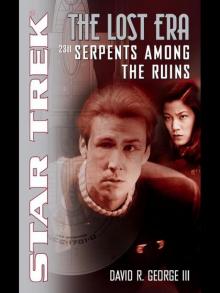 Serpents Among the Ruins
Serpents Among the Ruins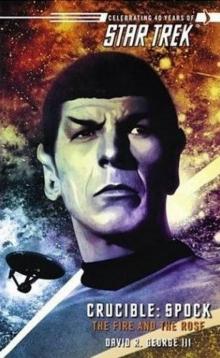 The Fire and the Rose
The Fire and the Rose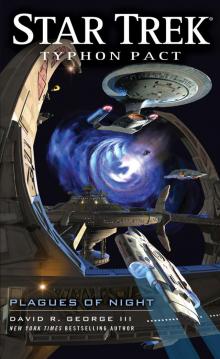 Star Trek: Typhon Pact 06: Plagues of Night
Star Trek: Typhon Pact 06: Plagues of Night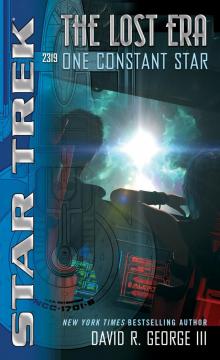 Star Trek: The Lost Era - 08 - 2319 - One Constant Star
Star Trek: The Lost Era - 08 - 2319 - One Constant Star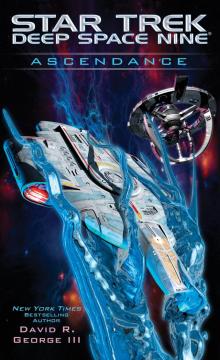 Star Trek: Deep Space Nine: Ascendance
Star Trek: Deep Space Nine: Ascendance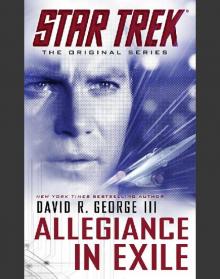 Star Trek: TOS: Allegiance in Exile
Star Trek: TOS: Allegiance in Exile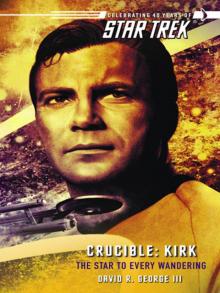 Crucible: Kirk
Crucible: Kirk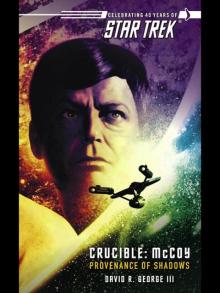 Crucible: McCoy
Crucible: McCoy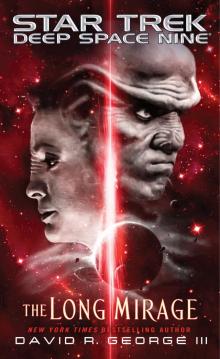 The Long Mirage
The Long Mirage Original Sin
Original Sin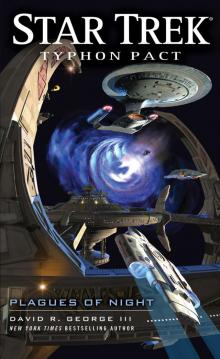 Star Trek: Typhon Pact: Plagues of Night
Star Trek: Typhon Pact: Plagues of Night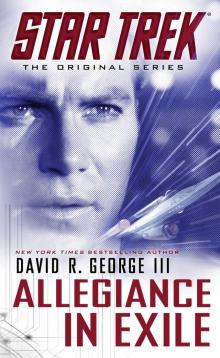 Allegiance in Exile
Allegiance in Exile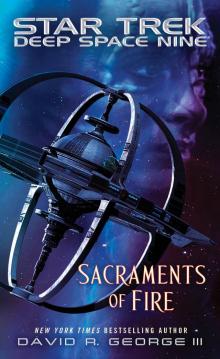 Sacraments of Fire
Sacraments of Fire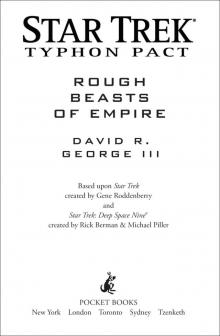 Star Trek: Typhon Pact: Rough Beasts of Empire
Star Trek: Typhon Pact: Rough Beasts of Empire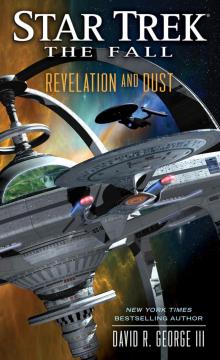 Star Trek: The Fall: Revelation and Dust
Star Trek: The Fall: Revelation and Dust